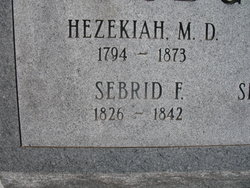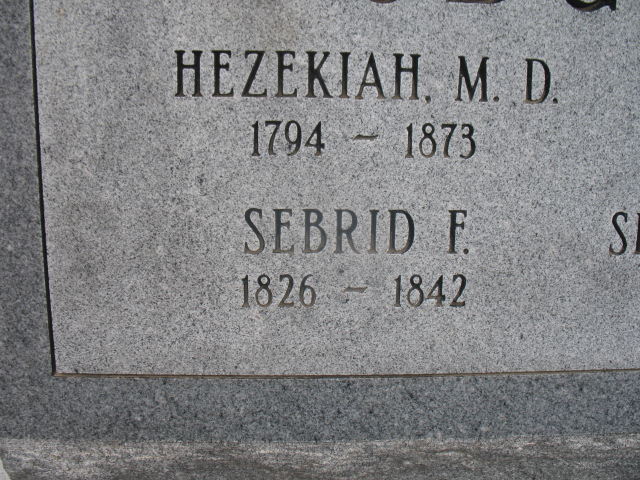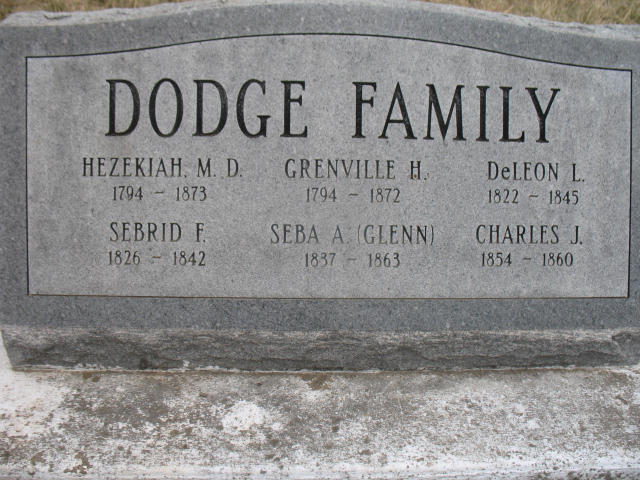Dr. Hezekiah Dodge was born in Connecticut, October 28,1794. He emigrated to the state of Georgia, where he married the daughter of a southern planter. Later, about the year 1826, he moved to Illinois and settled in the pioneer settlement on Bay Creek at the present site of the bridge, one and one-half miles southeast of Pleasant Hill. He was probably the first physician and surgeon to locate in this section of
Pike county. Dr. Dodge died February 28, 1873 and is buried, in Dodge Cemetery on the banks of Bay Creek north of the bridge. The stone marking his resting place is in the view of travelers as they pass along the bluff road.
Chapter 182 Jess M. Thompson's Pike County IL History
DR. HEZEKIAH DODGE, whose name is so intimately associated with early Bayville and the Barton and Collard families, was born near Pompey, New York, received a good education, studied medicine and was graduated from a New York City institution. He was a son of Ezra and Mary (Foote) Dodge, natives of Ireland and Wales respectively, both of whom died in the Empire State. He located for practice of his profession in Sweet Springs, Virginia, but afterwards removed to Augusta, Georgia, where he remained six years. There he married Grenville Haynes, native of Botetourt county, Virginia, and daughter of Joseph and Jane Haynes, he a native of England, she of Ireland. The Haynes family had located on a Georgia plantation, near the town of Augusta. In October, 1825 (or 1826) Dr. Dodge came to Illinois, traveling in a wagon and bringing with him four slaves whom he disposed of at Edwardsville, where he located for a short time, coming thence to the location on Bay Creek in what is now Pleasant Hill township, in the fall of 1826 (or 1827). One record indicates that he located at Edwardsville in October, 1826, and came to Pleasant Hill township a year later, October, 1827. The Dodges, as noted in a preceding chapter, came to the Bay Creek country close upon the heels of Thomas and Rebecca (Holland) Barton (parents of John J. Collard's wife), who had removed from Kentucky to Missouri & came thence to Pleasant Hill township in the spring or summer of 1826, crossing the Mississippi river on a raft. Mrs. Dodge was a native of the same Virginia settlement that nurtured Thomas Barton and Rebecca Holland. Grimshaw, the historian, describes Dr. Dodge of old Bayville as one of the most remarkable figures of early Pike county days, a "fit subject for a painter." He was "long, lean and lank," and particularly in a crowd and at court time he was the observed of all. He figured in one of the most noted lawsuits of early times. He charged one Zumwalt, a rival early-day miller on Bay Creek, with the destruction of his mill-dam at Bayville. Zumwalt was said to have remarked while at the home of his son-in-law on the night of the destruction of Dodge's dam: "Just now the muskrats are working on old Dodge's dam." Alpheus Wheeler, the tall, ungainly Highland lawyer who was considered such an oddity in the Illinois legislature to which he was elected from Pike county in 1838 and 1840, during this trial delivered one of those forensic outbursts that are numbered among the classics of the Pike county bar. Said he, assailing the character of the prosecuting witness, Dr. Dodge: "Dr. Dodge are a man so devoid of truth that when he speaks the truth he are griped." John Jay Ross, another attorney of that day, laughed so uproariously at Wheeler's outburst that the latter turned upon him and, bringing down his long arm with a majestic sweep, shouted: "I wish I had a tater, I would throw it down your throat."
PLEASANT HILL DOCTORS
No review of Pleasant Hill history would be complete without mention being made of those guardians of health and life in the community, the Doctors. This community has been very fortunate in the many worthy men who represented that profession and have so capably looked after the sick and afflicted in this community.
Dr. Hezekiah Dodge was born in Connecticut, October 28,1794. He emigrated to the state of Georgia, where he married the daughter of a southern planter. Later, about the year 1826, he moved to Illinois and settled in the pioneer settlement on Bay Creek at the present site of the bridge, one and one-half miles southeast of
Pleasant Hill. He was probably the first physician and surgeon to locate in this section of Pike county. Dr. Dodge died February 28,
1873 and is buried in Dodge Cemetery on the banks of Bay Creek north of the bridge. The stone marking his resting place is in the view of travelers as they pass along the bluff road.
Dr. Hezekiah Dodge was born in Connecticut, October 28,1794. He emigrated to the state of Georgia, where he married the daughter of a southern planter. Later, about the year 1826, he moved to Illinois and settled in the pioneer settlement on Bay Creek at the present site of the bridge, one and one-half miles southeast of Pleasant Hill. He was probably the first physician and surgeon to locate in this section of
Pike county. Dr. Dodge died February 28, 1873 and is buried, in Dodge Cemetery on the banks of Bay Creek north of the bridge. The stone marking his resting place is in the view of travelers as they pass along the bluff road.
Chapter 182 Jess M. Thompson's Pike County IL History
DR. HEZEKIAH DODGE, whose name is so intimately associated with early Bayville and the Barton and Collard families, was born near Pompey, New York, received a good education, studied medicine and was graduated from a New York City institution. He was a son of Ezra and Mary (Foote) Dodge, natives of Ireland and Wales respectively, both of whom died in the Empire State. He located for practice of his profession in Sweet Springs, Virginia, but afterwards removed to Augusta, Georgia, where he remained six years. There he married Grenville Haynes, native of Botetourt county, Virginia, and daughter of Joseph and Jane Haynes, he a native of England, she of Ireland. The Haynes family had located on a Georgia plantation, near the town of Augusta. In October, 1825 (or 1826) Dr. Dodge came to Illinois, traveling in a wagon and bringing with him four slaves whom he disposed of at Edwardsville, where he located for a short time, coming thence to the location on Bay Creek in what is now Pleasant Hill township, in the fall of 1826 (or 1827). One record indicates that he located at Edwardsville in October, 1826, and came to Pleasant Hill township a year later, October, 1827. The Dodges, as noted in a preceding chapter, came to the Bay Creek country close upon the heels of Thomas and Rebecca (Holland) Barton (parents of John J. Collard's wife), who had removed from Kentucky to Missouri & came thence to Pleasant Hill township in the spring or summer of 1826, crossing the Mississippi river on a raft. Mrs. Dodge was a native of the same Virginia settlement that nurtured Thomas Barton and Rebecca Holland. Grimshaw, the historian, describes Dr. Dodge of old Bayville as one of the most remarkable figures of early Pike county days, a "fit subject for a painter." He was "long, lean and lank," and particularly in a crowd and at court time he was the observed of all. He figured in one of the most noted lawsuits of early times. He charged one Zumwalt, a rival early-day miller on Bay Creek, with the destruction of his mill-dam at Bayville. Zumwalt was said to have remarked while at the home of his son-in-law on the night of the destruction of Dodge's dam: "Just now the muskrats are working on old Dodge's dam." Alpheus Wheeler, the tall, ungainly Highland lawyer who was considered such an oddity in the Illinois legislature to which he was elected from Pike county in 1838 and 1840, during this trial delivered one of those forensic outbursts that are numbered among the classics of the Pike county bar. Said he, assailing the character of the prosecuting witness, Dr. Dodge: "Dr. Dodge are a man so devoid of truth that when he speaks the truth he are griped." John Jay Ross, another attorney of that day, laughed so uproariously at Wheeler's outburst that the latter turned upon him and, bringing down his long arm with a majestic sweep, shouted: "I wish I had a tater, I would throw it down your throat."
PLEASANT HILL DOCTORS
No review of Pleasant Hill history would be complete without mention being made of those guardians of health and life in the community, the Doctors. This community has been very fortunate in the many worthy men who represented that profession and have so capably looked after the sick and afflicted in this community.
Dr. Hezekiah Dodge was born in Connecticut, October 28,1794. He emigrated to the state of Georgia, where he married the daughter of a southern planter. Later, about the year 1826, he moved to Illinois and settled in the pioneer settlement on Bay Creek at the present site of the bridge, one and one-half miles southeast of
Pleasant Hill. He was probably the first physician and surgeon to locate in this section of Pike county. Dr. Dodge died February 28,
1873 and is buried in Dodge Cemetery on the banks of Bay Creek north of the bridge. The stone marking his resting place is in the view of travelers as they pass along the bluff road.
Family Members
Advertisement
Advertisement
















